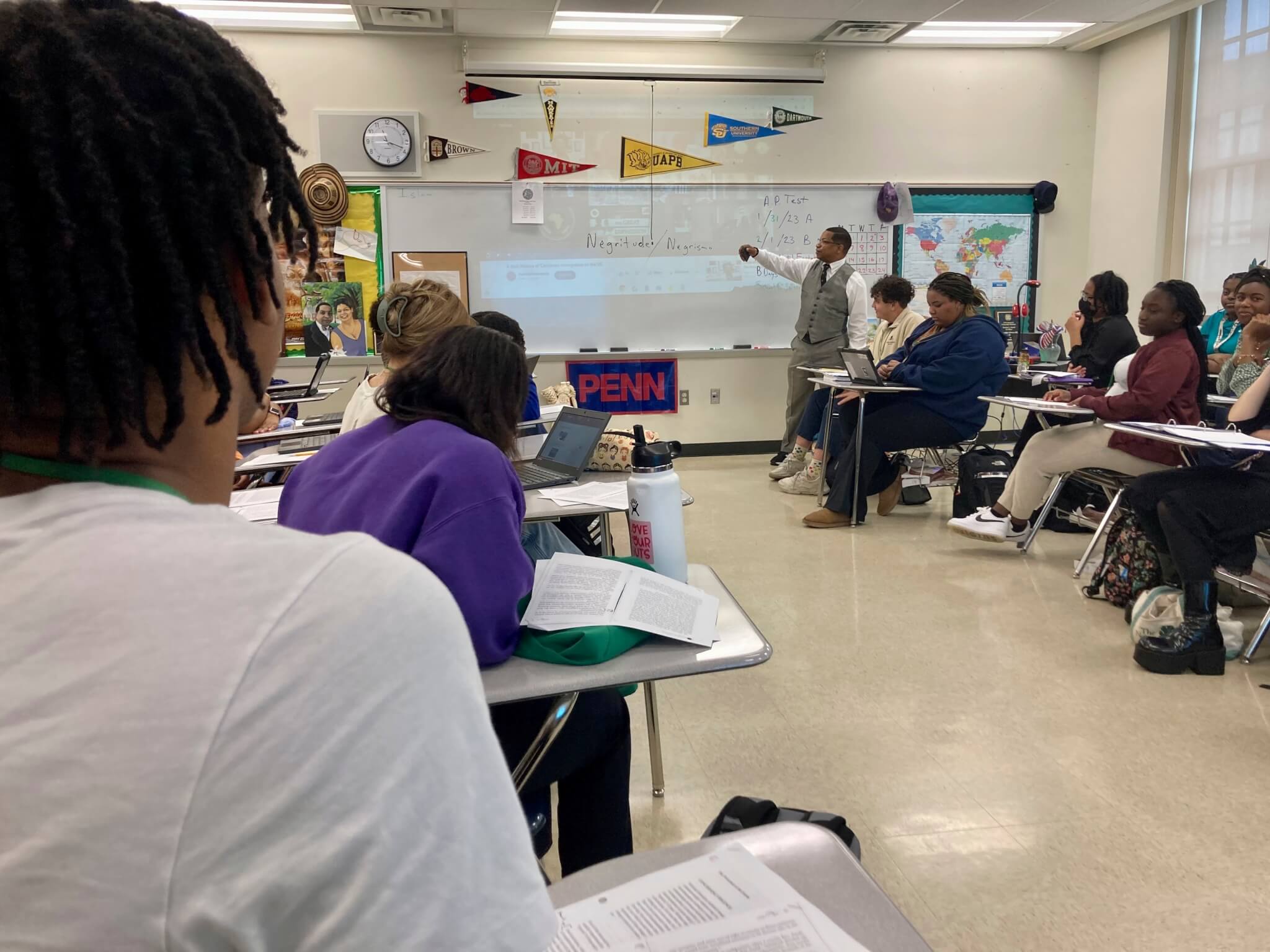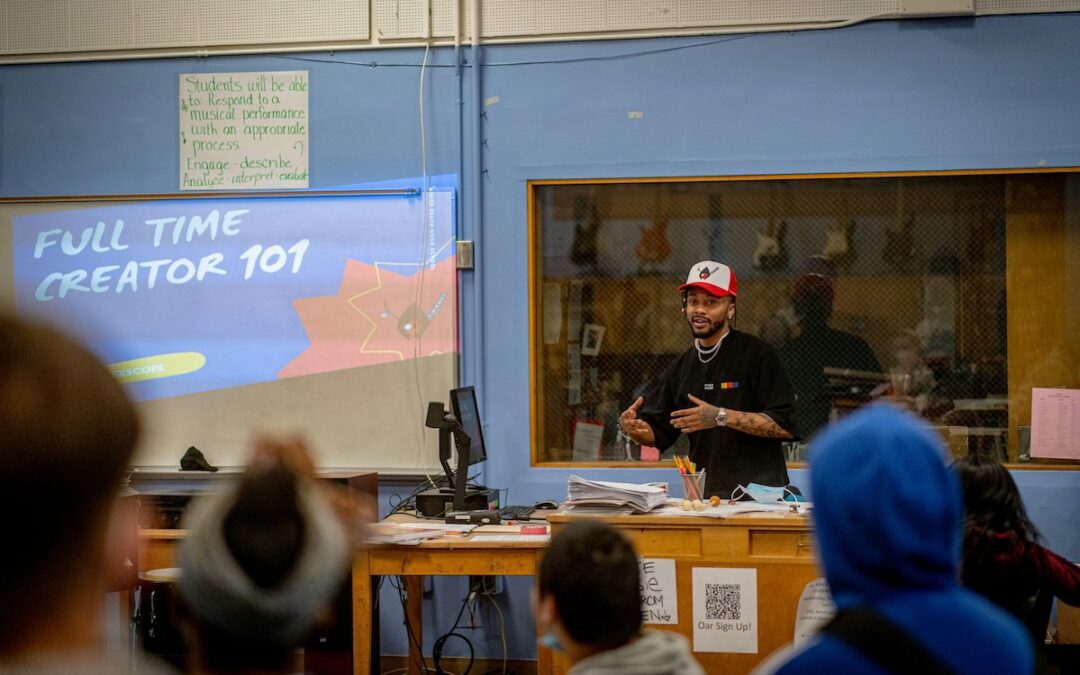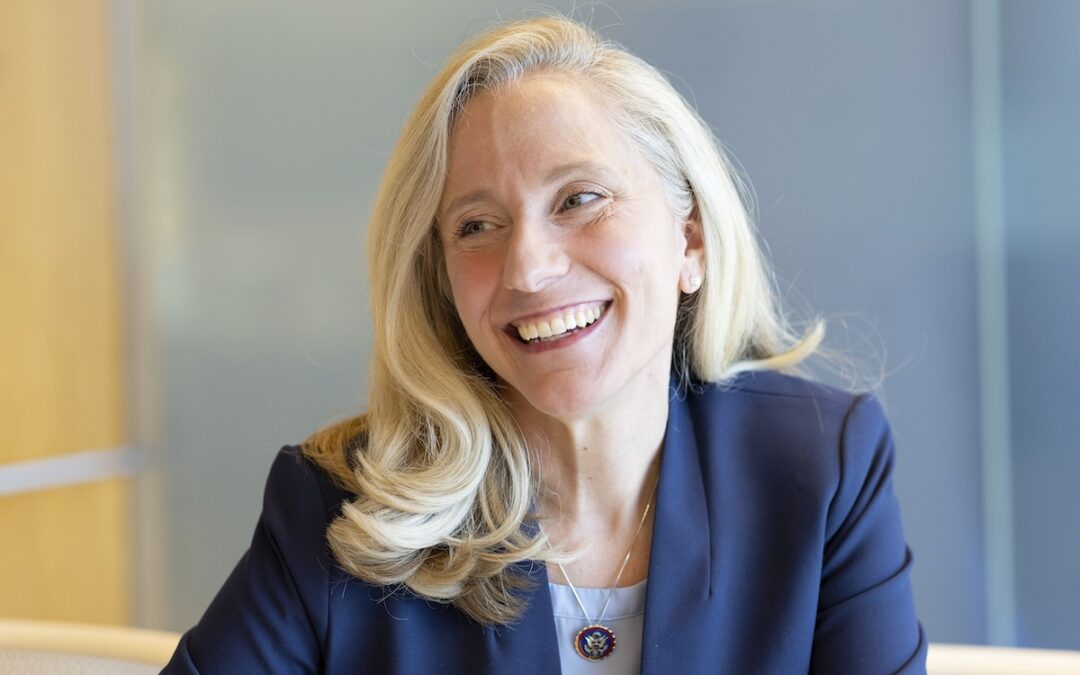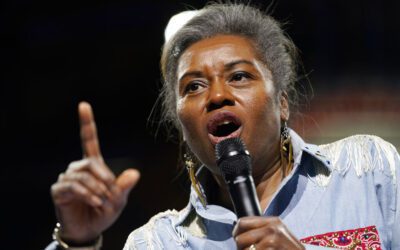
Emmitt Glynn teaches AP African American studies to a group of Baton Rouge Magnet High School students on Monday, Jan. 30, 2023 in Baton Rouge, La. Baton Rouge Magnet High School in Louisiana is one of 60 schools around the country testing the new course, which has gained national attention since it was banned in Florida. (AP Photo/Stephen Smith)
School districts in Fairfax, Arlington, and Caroline counties have said that they plan to offer the pilot Advanced Placement African American Studies course next school year, despite ongoing scrutiny from officials in several states.
Over the past several months, the course has become “the center of a political firestorm” after Florida Gov. Ron DeSantis rejected the course, calling it “woke” and an example of progressive “indoctrination”—comments made as he attempts to appeal to the Republican base ahead of a likely presidential run in 2024.
Shortly thereafter, the College Board, the nonprofit organization that oversees AP courses, revised the course, taking out lessons on Black Lives Matter, reparations, and other topics. The College Board has maintained that these lessons are not banned from being taught, however, and that the revisions were not prompted by DeSantis’ comments.
School officials in the three Virginia school systems have said that students in their districts will be able to take AP African American Studies starting in the 2023-24 school year. The course covers a wide range of Black history and cultural topics; it was initially offered this school year in about 60 classrooms across the country, and will become widely available in fall 2024.
Last month, Gov. Glenn Youngkin directed Virginia education officials to determine whether the course conflicts with one of his executive orders. On his first day in office, Youngkin passed an order which forbids teaching what he described as “inherently divisive concepts, including Critical Race Theory,” a graduate school-level concept used to describe the idea that racism can be embedded in laws and policies that produce (and reproduce) racial inequality.
“I don’t have any specific concerns, other than under my Executive Order One. I want to make sure there aren’t inherently divisive concepts used in the teaching of this course,” said Gov. Glenn Youngkin during the CNN Town Hall held on March 9, in reference to the AP African American Studies course.
“The term ‘Critical Race Theory’ has been co-opted by opponents as a catch-all and rallying cry to silence any discussions about systemic racism, ban the truthful teaching of American history, and reverse progress toward racial justice,” the NAACP’s Legal Defense Fund asserts. “Attempts to ban CRT are really attacks on free speech, on discussions about the truthful history of race and racism in the U.S., and the lived experiences of Black people and other people of color.”
Youngkin spokesperson Macaulay Porter told The Washington Post that the review is ongoing and did not offer a timeline of when it would be completed. Youngkin’s review, however, will not affect local school systems’ ability to offer the AP course as an elective. It will only determine whether the class can count toward a required history credit needed for graduation in Virginia schools, an education department spokesperson told the Post.
Virginia Secretary of Education Aimee Guidera told the Post that the review of the course is necessary “to ensure that our students are being taught how to think, and not what to think,”—though she provided no evidence that this is happening—and that the administration is “hoping the College Board’s revisions to the pilot will address ‘national concerns’ about the course and the state can offer it.”
In a letter to Youngkin, four Fairfax County School Board members wrote that “Virginia has been the backdrop for key moments of African American history,” and that the state has a “moral obligation” to students to teach them “a complete history.”
Thirty-two Virginia school districts told The Washington Post that it’s too soon to tell whether they will be offering AP African American Studies next school year.
In Fairfax County, the course will be offered at the following high schools: Chantilly, Fairfax, Hayfield, McLean, South County, Westfield, West Potomac, and Woodson. According to officials, it will depend on student enrollment. In Arlington, Wakefield and Washington-Liberty high schools will offer the course next year, along with Caroline High School in Caroline County.
Having the class taught in Caroline County is significant, as that’s where the landmark Loving v. Virginia Supreme Court case originated. The Court ruled in that case that laws banning interracial marriage violate the Equal Protection and Due Process Clauses of the 14th amendment.

Virginia public schools had more than 3,200 unfilled teaching positions in 2024-25
Something’s missing in Virginia classrooms—and it’s not just school supplies. According to the Virginia Department of Education Teacher Vacancy...

Botetourt County Public Schools reinstated random student drug testing
A previously paused policy is back in Botetourt—here’s what it means for students signing up for extracurriculars and parking permits. Following a...

Phones off: Hanover Schools’ policy results in 1,600+ confiscations
One school division went all-in on unplugging during the day—and the results are in. Over 1,600 mobile devices were confiscated at Hanover County...

New federal loan limits could derail Virginia students’ path to medical school
This story by Shalina Chatlani was produced by Stateline and reviewed and distributed by Stacker. Twenty-eight-year-old Michaela Bonner has been...

Public school defender Ghazala Hashmi takes on right-wing radio’s Reid for lieutenant governor
Sen. Ghazala Hashmi, a mom of two daughters, is clear about the choice Virginians face when they go to the polls this November. Do they want to...

The Spanberger strategy: Can this Virginia Democrat reset the politics of public education?
This story was originally reported by Mel Leonor Barclay of The 19th. Meet Mel and read more of her reporting on gender, politics and policy. During...




